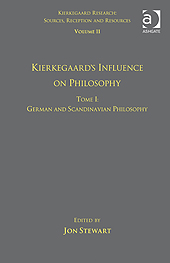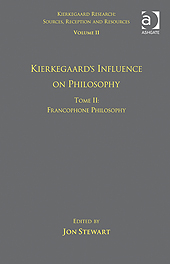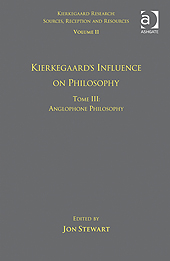
Volume 11:
Kierkegaard's Influence on Philosophy
Edited by
Jon Stewart
Tome
I: German and Scandinavian Philosophy
Farnham and Burlington: Ashgate 2012. xix+312pp.
Tome
II: Francophone Philosophy
Farnham and Burlington: Ashgate 2012. xiii+266pp.
Tome III: Anglophone
Philosophy
Farnham and Burlington: Ashgate 2012. xiii+239pp.
Kierkegaard’s relation to the
field of philosophy is a particularly complex and disputed one.
He rejected the model of philosophical inquiry that was
mainstream in his day and was careful to have his pseudonymous
authors repeatedly disassociate themselves from philosophy. But
although it seems clear that Kierkegaard never regarded himself
as a philosopher, nonetheless there can be no doubt that his
writings contain philosophical ideas. Many later
thinkers have used his works as a source of insights and ideas
that they could apply in the context of their own philosophical
program. As a result, his thought has been profoundly
influential in a number of different philosophical traditions.
The present volume attempts to document these different
traditions of the philosophical reception of Kierkegaard’s
thought. The articles featured here aim to demonstrate the vast
reach of Kierkegaard’s writings in philosophical contexts that
were often quite different from his own.
Tome I: German and Scandinavian Philosophy
Tome I is dedicated to exploring the reception of Kierkegaard in
Germanophone and Scandinavian philosophy. As is the case in
theology, his influence in philosophy is particularly strong in
the German-speaking world. Kierkegaard has been a major
influence for such different philosophical projects as
phenomenology, hermeneutics, dialogical thinking, critical
theory, Marxism, logical positivism and ordinary language
philosophy. Similarly, in Denmark and Norway, Kierkegaard’s
writings have been more or less constantly discussed by
important philosophers, despite the later dominance of analytic
philosophy in these countries. The present volume features
articles on the leading Germanophone and Scandinavian
philosophers influenced by Kierkegaard’s thought.
Table of Contents
Part I: German Philosophy
Theodor W. Adorno: “Tracing the Trajectory of Kierkegaard’s
Unintended Triumphs and Defeats”
Peter
Šajda
Walter Benjamin: Appropriating the Kierkegaardian
Aesthetic
Joseph Westfall
Ernst Bloch: The Thinker of Utopia’s Reading of
Kierkegaard
Alina Vaisfeld
Wilhelm Dilthey: Kierkegaard's Influence on Dilthey's
Work
Elisabetta Basso
Ferdinand Ebner: Ebner’s Neuer Mann
Dustin Feddon and Patricia Stanley
Hans-Georg Gadamer: Kierkegaardian Traits in Gadamer’s
Philosophical Hermeneutics
Luiz Rohden
Edmund Husserl: Naturalism, Subjectivity, Eternity
Jamie Turnbull
Karl Löwith: In Search of Singular Man
Noreen Khawaja
Michael Theunissen: Fortune and Misfortune of Temporality
Stefan Egenberger
Ludwig Wittgenstein: Kierkegaard’s Influence on the
Origin of Analytic Philosophy
Thomas Miles
Part II:
Scandinavian Philosophy
Hans Brøchner: Professor of Philosophy,
Antagonist—and a Loving
and Admiring Relative
Carl Henrik Koch
Harald Høffding: The Respectful Critic
Carl Henrik Koch
Peter Wessel
Zapffe: Kierkegaard as a Forerunner
of Pessimistic Existentialism
Roe Fremstedal
Reviews
"...when one marvels at the scope of this series as a whole, it
becomes clear that this tome fits into a broader collection which
approaches the subject of Kierkegaard from about as balanced and
diverse a perspective as one might expect to find, making it an
invaluable resource."
Mark Daniel Safstrom, German Studies Review, vol. 36, no. 1, 2013, pp.
191-193.
Tome II:
Francophone Philosophy
Tome II is dedicated to exploring Kierkegaard’s
influence on Francophone philosophy. The French intellectual
tradition squares well with Kierkegaard’s eclectic profile since
its leading figures are often difficult to classify
unambiguously as philosophers, theologians, literary critics or
simply writers. Kierkegaard’s thinking was influential
for many generations of French philosophers right up to this
very day. Ever since the discovery of Kierkegaard in the
Francophone world, he has remained a fixed pillar in French
philosophy. He has been
influential in the context of most every modern school of French
thought: phenomenology, feminism, structuralism,
post-structuralism, semiotics, and deconstruction.
Table of Contents
Sylviane Agacinski: Reading Kierkegaard to Keep Intact the
Secret
Kevin Newmark
Roland Barthes: Style, Language, Silence
Joseph Westfall
Georges Bataille: Kierkegaard and the Claim for the
Sacred
Laura Llevadot Pascual
Maurice Blanchot: Spaces of Literature / Spaces of
Religion
Daniel Greenspan
Gilles Deleuze: Kierkegaard’s Presence in his Writings
José M. Miranda Justo
Jacques Derrida: Faithful Heretics
Marius Timmann Mjaaland
Jacques Ellul: Kierkegaard’s Profound and Seldom
Acknowledged Influence on Ellul’s Writing
Sarah Pike Cabral
Pierre Hadot: Philosophy as a Way of Life: Hadot and
Kierkegaard’s Socrates
Nicolae Irina
Emmanuel Lévinas: An Ambivalent but Decisive Reception
Jeffrey Hanson
Jean-Luc Marion: The Paradoxical Givenness of Love
Leo Stan
Paul Ricoeur: On Kierkegaard, the Limits of Philosophy,
and the Consolation of Hope
Joel D.S. Rasmussen
Reviews
"This collection of
essays belongs to the ‘reception’ section of Jon Stewart’s vast editorial
project, Kierkegaard Research: Sources, Reception
and Resources....This
book, the second tome of volume 11, Kierkegaard’s Influence on Philosophy,
provides an extremely useful starting-point for exploring the diverse responses
to Kierkegaard’s texts and ideas in twentieth-century French thought."
Clare Carlisle, H-France
Review, vol. 13, no. 168, 2013, pp. 1-3.
________________________
"A
brilliant example of scholarship, this well-referenced collection will appeal
to specialists."
Yolande
Aline Helm, French Review, vol. 88, no. 2, October 2014, p. 251.
Tome III: Anglophone Philosophy
Tome III traces Kierkegaard’s influence on
Anglophone philosophy. It has long been thought that Kierkegaard
played no role in this tradition, which for years was dominated
by analytic philosophy. In this environment it was common to
dismiss Kierkegaard along with the then current European
philosophers who were influenced by him. However, a closer look
reveals that in fact there were several thinkers in the US,
Canada and Great Britain who were inspired by Kierkegaard even
during the heyday of analytic philosophy. Leading Anglophone
philosophers read Kierkegaard and made at least some limited use
of him. The situation today is much different. It can be said
that Kierkegaard has made some serious inroads into mainstream
Anglophone philosophy, and many authors are today seeking
inspiration in his works for current discussions concerning
ethics, personal identity, philosophy of religion, and
philosophical anthropology.
Table of Contents
O.K. Bouwsma: Kierkegaard, Wittgenstein, and Conceptual
Clarity
Ron E. Hustwit
Sr.
Stanley
Cavell: The Sublimity of the Pedestrian
Joseph Westfall
Paul De Man: The Unwritten Chapter
J.D. Mininger
Hubert Dreyfus: Seeking the Self in a Nihilistic Age
Joseph Westfall
Paul Edwards: A Rationalist Critic of Kierkegaard's
Theory of Truth
Timothy J. Madigan
William James: Living Forward and the Development of
Radical Empiricism
J. Michael Tilley
Walter Kaufmann: “That Authoritarian,” “That Individual”
Andrew D. Spear
Alasdair MacIntyre: A Continuing Conversation
Anthony Rudd
Iris Murdoch:
Kierkegaard as Existentialist, Romantic, Hegelian, and
Problematically Religious
Paul Martens
D.Z. Phillips: Grammar and the Reality of God
Jamie Turnbull
Richard Rorty: Kierkegaard in the Context of
Neo-Pragmatism
J. Aaron Simmons
Gillian Rose: Making Kierkegaard Difficult Again
Vincent Lloyd
Charles Taylor: Taylor’s Affinity to Kierkegaard
Abrahim H. Khan















